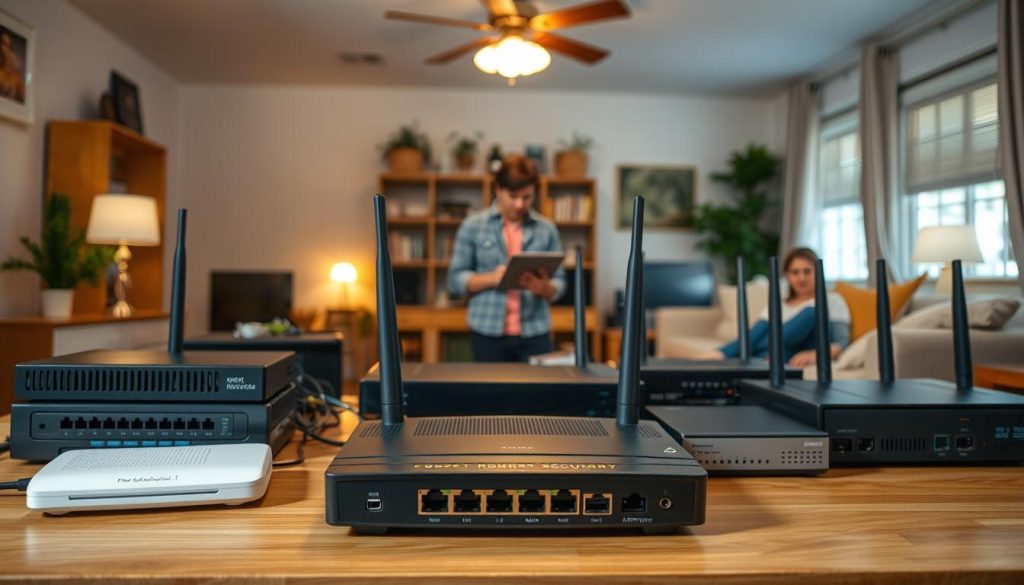As you navigate the digital landscape, protecting your online privacy becomes increasingly important. The type of router you use plays a significant role in safeguarding your personal data. Whoever controls your home network has unrestricted access to the information passing through it.
In this article, we’ll delve into the differences between mesh Wi-Fi systems and traditional routers, exploring their implications for your privacy and security. By understanding the strengths and weaknesses of each, you’ll be better equipped to make an informed decision about which is safer for your online activities.
Let’s examine the key aspects of Wi-Fi network protection and how they impact your data privacy.
Understanding Wi-Fi Technology
Wi-Fi technology is the invisible network that keeps us connected, but how does it actually work? At its core, Wi-Fi is a type of wireless networking technology that allows devices to connect to the internet or communicate with each other without the use of cables or wires.
Mesh Wi-Fi systems and traditional routers are two different approaches to providing Wi-Fi connectivity. Traditional routers use a single device to broadcast the Wi-Fi signal, whereas mesh Wi-Fi systems utilize multiple nodes or access points to create a network of interconnected Wi-Fi signals.
This difference in architecture has significant implications for the coverage, reliability, and security of your Wi-Fi network. Mesh Wi-Fi systems are designed to provide a strong, reliable connection throughout your home or office by ensuring that there are multiple sources of Wi-Fi signal available.
In contrast, traditional routers can sometimes struggle to provide a consistent signal, especially in larger spaces or areas with many obstacles like walls and floors. Understanding these differences is crucial for making an informed decision about which type of Wi-Fi system is best for your needs.
When it comes to security and privacy, both mesh Wi-Fi and traditional routers have their own set of considerations. The security of your Wi-Fi network depends on various factors, including the type of router or mesh system you use, how it’s configured, and the security protocols in place.
- Mesh Wi-Fi systems often come with advanced security features and the ability to automatically update and secure all nodes in the network.
- Traditional routers also offer security features, but their effectiveness can depend on the specific model and how it’s set up.
By understanding how Wi-Fi technology works and the differences between mesh Wi-Fi systems and traditional routers, you can better evaluate your options for securing your wireless connection.
Security Features of Mesh Wi-Fi Systems
You can enhance your home network’s security by understanding the features of mesh Wi-Fi systems. Mesh Wi-Fi systems are designed to provide robust security across your entire home, ensuring that every corner is covered without any dead spots.

One of the key security features of mesh Wi-Fi systems is their ability to employ advanced network encryption methods. These methods protect your data as it travels between devices connected to the network, safeguarding your personal data security.
Security Protocols in Mesh Wi-Fi
Mesh Wi-Fi systems utilize various security protocols to ensure your network remains secure. These include:
- Encryption protocols like WPA3 to secure your network
- Regular firmware updates to patch vulnerabilities
- Secure authentication methods to prevent unauthorized access
By understanding and leveraging these security features, you can significantly enhance the security of your home network.
Security Features of Traditional Routers
Understanding the security features of traditional routers is crucial for protecting your internet privacy. Traditional routers have been the backbone of home networking, providing a robust connection and various security features to safeguard your Wi-Fi network.
One of the key security features of traditional routers is their ability to provide firewall protection. Most traditional routers come equipped with a built-in firewall that monitors and controls incoming and outgoing network traffic based on predetermined security rules. This helps block malicious data packets and prevents unauthorized access to your network.
Another important security feature is WPA2 encryption (or the more recent WPA3). Traditional routers use this encryption to secure your Wi-Fi network, ensuring that data transmitted between your devices and the router is encrypted and protected from eavesdropping.

Traditional routers also often include features like guest networking, which allows you to create a separate network for visitors, keeping your main network secure. Additionally, many modern traditional routers support Quality of Service (QoS), enabling you to prioritize traffic to critical applications and devices, thereby enhancing overall network security and performance.
Comparison of Security Features in Traditional Routers
| Security Feature | Description | Benefit |
|---|---|---|
| Firewall Protection | Monitors and controls network traffic | Blocks malicious data packets |
| WPA2/WPA3 Encryption | Encrypts data transmitted over the network | Protects against eavesdropping |
| Guest Networking | Creates a separate network for visitors | Keeps main network secure |
| Quality of Service (QoS) | Prioritizes traffic to critical applications | Enhances network security and performance |
While traditional routers offer robust security features, it’s essential to regularly update your router’s firmware to ensure you have the latest security patches. Moreover, using a strong password and configuring your router’s settings correctly can significantly enhance your Wi-Fi network protection.
Privacy Risks with Mesh Wi-Fi
Understanding the privacy risks associated with mesh Wi-Fi is crucial for safeguarding your personal data. Mesh Wi-Fi systems, like any other network technology, can be vulnerable to privacy risks if not properly secured.
One of the primary concerns with mesh Wi-Fi is the potential for data collection and surveillance. Since mesh networks consist of multiple nodes that work together to provide coverage, there’s a higher risk of data being intercepted or misused. Each node in the network can potentially be a point of vulnerability.

To mitigate these risks, it’s essential to choose a mesh Wi-Fi system from a reputable manufacturer that prioritizes security and privacy. Look for systems that offer robust encryption and regular software updates. Additionally, configuring your mesh network correctly is crucial. This includes setting up a strong password, enabling WPA3 encryption, and ensuring that the network name (SSID) is not easily identifiable.
Key Considerations for Secure Mesh Wi-Fi
| Feature | Description | Importance |
|---|---|---|
| Encryption | WPA3 encryption for secure data transmission | High |
| Software Updates | Regular updates to patch vulnerabilities | High |
| Network Configuration | Proper setup to prevent unauthorized access | High |
Furthermore, being mindful of the data you transmit over your mesh Wi-Fi network is important. Avoid using public or unsecured networks for sensitive activities. By taking these precautions, you can significantly enhance the security and privacy of your mesh Wi-Fi network.
In comparison to traditional routers, mesh Wi-Fi systems offer a different set of challenges and benefits regarding privacy. While mesh systems provide comprehensive coverage and can be more convenient, they also require more complex setup and maintenance, which can impact their security.
Privacy Risks with Traditional Routers
Understanding the privacy risks associated with traditional routers is crucial for protecting your personal data. Traditional routers, like any other networking device, can be vulnerable to internet privacy concerns if not properly secured.
One of the primary traditional router privacy risks is the potential for data collection and surveillance. Traditional routers often come with features that can be exploited by hackers or utilized by the router’s manufacturer for data collection purposes. For instance, some routers may collect user data for analytics or advertising, which can be a significant personal data security concern.
To minimize these risks, it’s essential to take several precautions. First, ensure that your traditional router’s firmware is always up to date, as updates often include patches for known security vulnerabilities. Additionally, changing the default administrator password and enabling WPA3 encryption (or WPA2 if WPA3 is not available) can significantly enhance your router’s security.
You should also consider disabling any features you don’t use, such as remote management or UPnP (Universal Plug and Play), as these can be exploited by malicious actors. Furthermore, using a guest network for IoT devices can help segregate your main network and reduce the risk of a breach.
By being aware of the potential traditional router privacy risks and taking proactive steps to secure your device, you can significantly improve your personal data security and enjoy a safer online experience.
How User Behavior Impacts Security
User behavior is a critical factor that impacts the security of your Wi-Fi connection. The actions you take, or fail to take, can significantly influence the safety of your online activities.
One of the simplest yet most effective ways to enhance your Wi-Fi security is by using strong passwords. Avoid using easily guessable information such as your name, birthdate, or common words. Instead, opt for a complex mix of characters, numbers, and special characters. This makes it harder for unauthorized users to gain access to your network.

Keeping your router’s software up to date is another crucial step. Manufacturers regularly release updates that patch security vulnerabilities and improve overall performance. By staying current, you reduce the risk of your network being exploited through known weaknesses.
Fragmenting your exposure by using different services or products for different needs can also help keep online privacy and security risks low. This approach limits the potential damage in case one of your accounts or devices is compromised.
To further secure your Wi-Fi network, consider implementing robust network encryption methods. WPA3 is currently the most secure protocol available, offering enhanced protection against various types of cyber threats.
- Use strong, unique passwords for your Wi-Fi network and devices.
- Regularly update your router’s firmware to protect against known vulnerabilities.
- Employ robust network encryption methods like WPA3.
- Be cautious when using public Wi-Fi networks, and consider using a VPN.
By adopting these practices, you can significantly enhance the security of your Wi-Fi network, protecting your personal data and maintaining a secure wireless connection.
Regulatory Standards and Compliance
The importance of regulatory compliance in Wi-Fi security cannot be overstated, as it directly impacts your data privacy. As you consider mesh Wi-Fi or traditional routers, understanding the regulatory landscape is crucial.
Regulatory standards vary by country, but in the United States, regulations such as the Children’s Online Privacy Protection Act (COPPA) and the General Data Protection Regulation (GDPR) influence how Wi-Fi manufacturers handle user data. Compliance with these regulations is not just about avoiding fines; it’s about ensuring that your Wi-Fi network is secure and respects user privacy.
When evaluating Wi-Fi systems, it’s essential to understand the privacy policies of the vendors. This includes knowing how they collect, use, and protect your data. Some mesh Wi-Fi systems, for instance, may collect more data than traditional routers due to their complex network setup and management features.
To make an informed decision, you should:
- Review the privacy policy of your Wi-Fi vendor to understand their data handling practices.
- Check for compliance with relevant regulatory standards in your region.
- Consider the security features of the Wi-Fi system and how they align with regulatory requirements.
By taking these steps, you can ensure that your chosen Wi-Fi solution not only meets your security needs but also complies with regulatory standards, thereby protecting your privacy.
Recommendations for Enhanced Security
Ensuring the security of your Wi-Fi network involves several key steps that can significantly reduce risks. To start, it’s essential to understand that a secure wireless connection is the foundation of protecting your personal data and devices from unauthorized access.
One of the most effective ways to enhance your Wi-Fi security is by implementing robust network encryption methods. Using WPA3 encryption is currently the most secure protocol available for Wi-Fi networks. If your router doesn’t support WPA3, consider upgrading to a newer model that does.
In addition to encryption, securing your Wi-Fi network involves setting a strong password and ensuring that your router’s firmware is up to date. Regular updates often include patches for security vulnerabilities that have been discovered since the last update.
Key Steps to Enhance Wi-Fi Security
- Use WPA3 encryption for your Wi-Fi network.
- Set a strong and unique password for your Wi-Fi network.
- Regularly update your router’s firmware.
- Enable the firewall on your router and individual devices.
- Use a Virtual Private Network (VPN) when connecting to public Wi-Fi networks.
When using public Wi-Fi, it’s crucial to be cautious. Public networks are often targeted by hackers because they are frequently unsecured. Using a VPN can significantly enhance your personal data security by encrypting your internet traffic, making it much harder for hackers to intercept your data.
| Security Measure | Description | Benefit |
|---|---|---|
| WPA3 Encryption | The latest Wi-Fi encryption protocol. | Provides strong protection against unauthorized access. |
| Regular Firmware Updates | Keeping your router’s software up to date. | Patches security vulnerabilities and improves stability. |
| VPN Usage | Using a Virtual Private Network on public Wi-Fi. | Encrypts internet traffic, protecting personal data. |
By following these recommendations, you can significantly enhance the security of your Wi-Fi network, protecting your personal data security and ensuring a secure wireless connection. Staying informed about the latest security measures and best practices is key to maintaining a secure online presence.
Evaluating Your Needs: Mesh vs. Traditional
To determine whether mesh Wi-Fi or a traditional router is right for you, consider your home’s layout and your internet usage. The size of your home and the number of devices connecting to the internet are crucial factors in this decision.
Mesh Wi-Fi systems are particularly beneficial for larger homes or those with multiple floors, as they provide a robust and reliable connection throughout. They consist of multiple nodes that work together to ensure seamless coverage.
In contrast, traditional routers might be more suitable for smaller spaces or for users who require high-speed connections for activities like gaming or streaming. They are often simpler to set up and can be more cost-effective.
When evaluating your needs, consider the level of security you require. Both mesh Wi-Fi and traditional routers have their own security features, but your specific situation will dictate which is more appropriate. Think about your internet privacy concerns and the level of Wi-Fi network protection you need.
Ultimately, the choice between mesh Wi-Fi and a traditional router should be based on a thorough assessment of your specific needs, including the size of your home, your internet usage patterns, and your concerns regarding data privacy comparison and internet privacy.
Conclusion: Making an Informed Decision
When choosing between mesh Wi-Fi and traditional routers, understanding the implications for your online privacy and security is crucial. Both options have their strengths and weaknesses, and making an informed decision depends on your specific needs.
Mesh Wi-Fi systems offer robust security features and seamless coverage, but may introduce additional privacy risks due to their complex network architecture. Traditional routers, on the other hand, provide a more straightforward setup, but may lack the advanced security features of mesh systems.
To make an informed decision, consider your priorities: if you value ease of use and strong security, mesh Wi-Fi might be the better choice. If you prefer a more traditional setup and are comfortable with configuring security settings, a traditional router could be the way to go.
Ultimately, your decision should be guided by your specific needs and concerns regarding privacy and security. By weighing the pros and cons of each option, you can choose the best solution for your online security and privacy.

